Why has New Zealand removed the ‘burp tax’ on livestock?
The burp tax was introduced in October 2022 under the leadership of then Prime Minister Jacinda Adern, whose Labour Party lost last year’s elections, making way for the currently ruling coalition led by the National Party.

Earlier this week, New Zealand’s centre-right government announced scrapping the ‘burp tax’ — a scheme to tax greenhouse gas emissions from livestock.
The burp tax was introduced in October 2022 under the leadership of then Prime Minister Jacinda Adern, whose Labour Party lost last year’s elections, making way for the currently ruling coalition led by the National Party.
Here is why the tax was introduced, and why it has been removed.
Why was the ‘burp tax’ introduced in New Zealand?
The primary aim of the scheme was to curtail methane emissions from ruminant species — they are hoofed grazing or browsing herbivores that chew cud. Ruminants such as cows, sheep, goats, and buffaloes have a special type of digestive system that allows them to break down and digest food that non-ruminant species would be unable to digest.
Stomachs of ruminant animals have four compartments, one of which, the rumen, helps them to store partially digested food and let it ferment. This partially digested and fermented food is regurgitated by the animals who chew through it again and finish the digestive process.
However, as grass and other vegetation ferments in the rumen, it generates methane, a potent greenhouse gas, which is one of the main drivers of climate change. Methane is responsible for 30% of the warming since preindustrial times, second only to carbon dioxide. Ruminant animals such as cows and sheep release this gas mainly through burping.
Given the very large numbers of cattle and sheep on farms in dairy-producing countries, these emissions add up to a significant volume. For instance, in New Zealand, there are around 10 million cattle and 25 million sheep, which are the source of nearly half of the country’s greenhouse gas emissions.
Therefore, the previous government decided to impose a tax on livestock.
Why has the tax been removed?
The introduction of the burp tax sparked protests by farmers across the country. They travelled in convoys of tractors and pick-up trucks to cities and towns to raise their demand to scrap the tax.
The farmers argued that the scheme coupled with other agriculture emission regulations would severely impact their livelihood. The then Labour Party-led government, however, did not budge.
The new centre-right coalition in power currently has decided to scrap the tax, saying it would explore other ways of reducing methane emissions.
In a statement, Agriculture Minister Todd McClay said, “The government is committed to meeting our climate change obligations without shutting down Kiwi farms… We are focused on finding practical tools and technology for our farmers to reduce their emissions in a way that won’t reduce production or exports.”